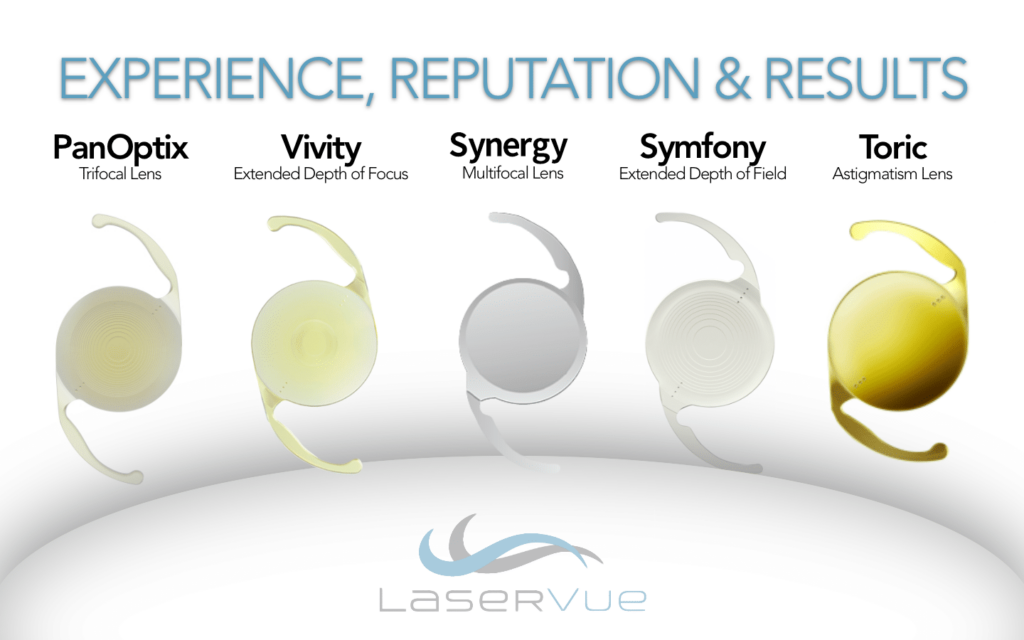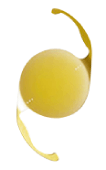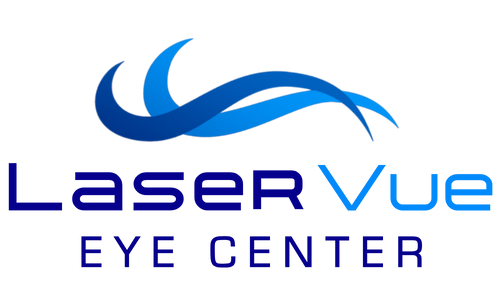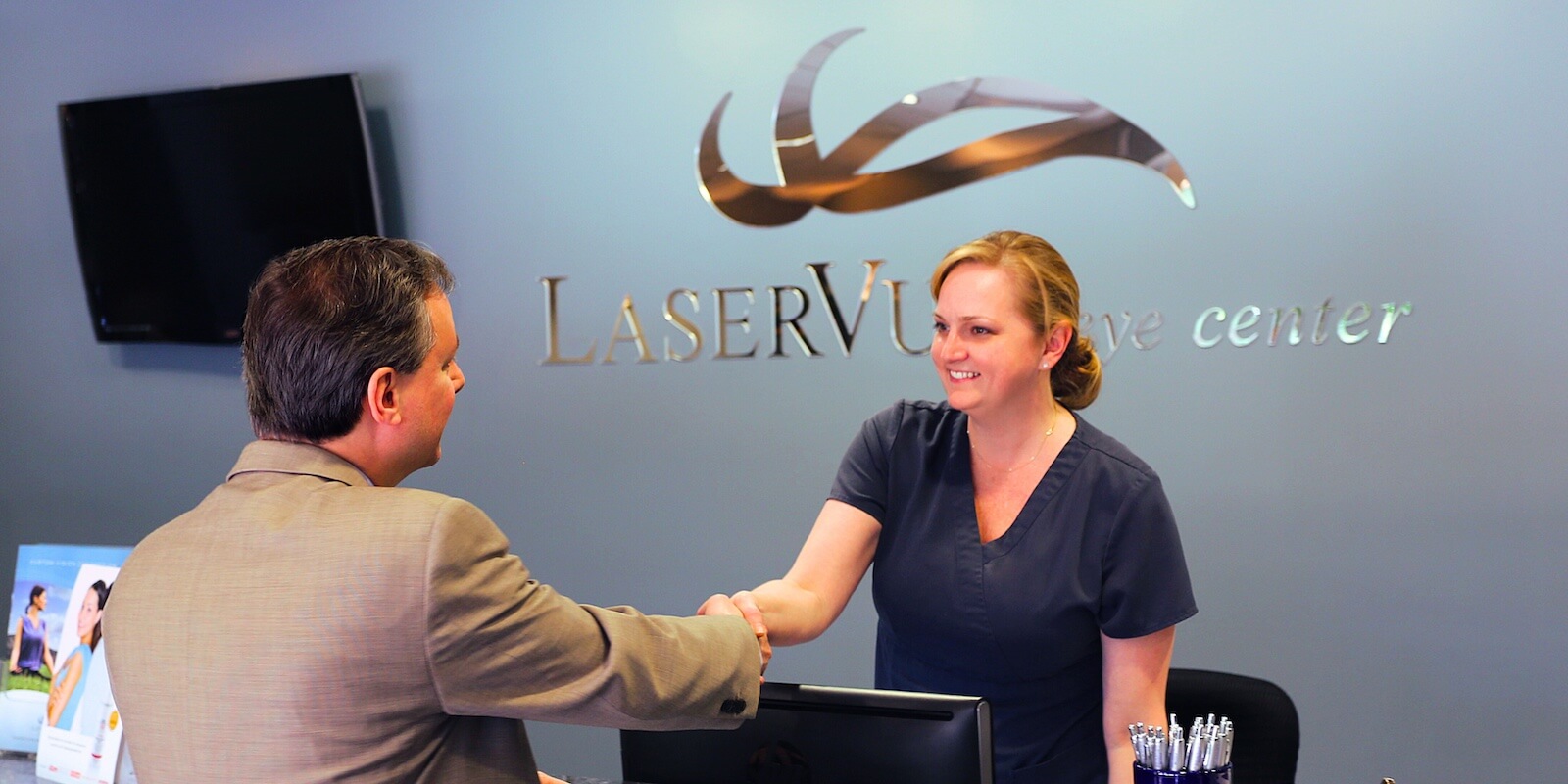How Would You Like to See?
Following removal of the eye’s natural crystalline lens during either Cataract or Clear Lens Exchange surgery, you have the option of choosing from a variety of intraocular lenses based upon your vision goals. These lenses include the standard monofocal vision lens, the Toric astigmatism correcting lens, the multifocal PanOptix & Tecnis Synergy lenses; and the extended depth of field Vivity lens.
Cataract Lens Options

LaserVue Eye Center doctors will evaluate your eyes and see if you are a candidate for any of the premium lifestyle intraocular lens options. If you are, we will then discuss which lifestyle IOL is most suitable for you and that best matches your visual goals.

Vision with a Cataracts
This is vision simulated through the eyes of a patient living with a cataract. Glasses cannot fully improve vision through a cataract and the patient must undergo cataract surgery to restore clear vision.
Post Cataract Surgery With Astigmatism
This is vision simulated through the eyes of a patient who has undergone cataract surgery, but has untreated astigmatism. The cataract has been removed and replaced with an artificial lens, but patients need glasses to see clearly at all distances. Not all patients require astigmatism correction as seen below in example #3.


Post Cataract Surgery With No Astigmatism
This is vision simulated through the eyes of a patient who has undergone cataract surgery and has no astigmatism. Some patients have little or no astigmatism after surgery and some require a Limbal Relaxing Incision (LRI) or Toric IOL to correct astigmatism. Patients with little to no astigmatism can usually see well in the distance, but must wear reading glasses to see up close.
Post Cataract Surgery With a Lifestyle Lens Implant
This is vision simulated through the eyes of a patient who has undergone cataract surgery and has elected to have a Multifocal LifeStyle lens implant. Most patients that have a Lifestyle lens implant can usually see well in the distance, intermediate and up close with little to no dependency on reading glasses or bifocals.

New! Alcon PanOptix Trifocal Lens
Redefine your vision with the PanOptix Trifocal Lens! The first trifocal lens available in the United States.
Hear From Dr. Bansal about PanOptix
Lens Implants Comparison & Benefits
| Quality Of Vision | ||||||
|---|---|---|---|---|---|---|
| STANDARD LENS | ADVANCED LASER | ADVANCED + TORIC LENS | ADVANCED + MULTIFOCAL | RxLAL | ||
| Post-op Vision without glasses | Distance | Good – if no astigmatism. Will need glasses for astigmatism | Good | Good | Good | Good |
| Intermediate | Fair | Fair | Fair | Good | Good | |
| Near Vision | Requires Reading Glasses | Requires Reading Glasses | Requires Reading Glasses | Good | Adjustable | |
| Post-op with glasses | Very Good | Very Good | Very Good | Very Good | Very Good | |
| Other factors | Night Vision | Good | Good | Good | May experience glare or halos | Good |
| Astigmatism | Not Corrected | Low amount corrected by laser | Corrected by ToricIOL | Corrected by IOL and/or laser | Corrected by adjustment | |
Lens Replacement & Cataract Surgery Options
| TYPE OF SURGERY | BASIC CATARACT SURGERY | ASTIGMATISM CORRECTING SURGERY | PREMIUM LENS REPLACEMENT |
|---|---|---|---|
| Astigmatism Correction | No | Yes | Yes |
| Type of Lens Used | Basic monofocal Lens | Astigmatism-correcting monofocal lens or basic monofocal lens with laser corneal astigmatism correction | Multifocal or Extended depth-of-focus |
| Dependence on glasses after surgery | Full Time. Bifocals or progressives for best near and far vision. | Reading glasses for computer and near. | Little to no dependence on glasses |
| Patient Benefits and surgical results | Safe ResultsImproved visionBifocals needed for near and far visionLowest patient cost | Excellent outcomes with greater precision, predictability, and accuracy Minimal to no reliance on glasses to see far awayReading glasses needed | Excellent outcomes with greater precision, predictability, and accuracy Minimal to no reliance on glasses to see far away, med-range, and near |
| Surgical enhancements to optimize vision after surgery | Not included | Yes, within the 1st year after surgery | Yes, within the 1st year after surgery |
Alcon Panoptix® Trifocal Lens
PanOptix delivers an exceptional combination of near, intermediate and distance vision and substantially reduces the need for glasses. This is the first and only trifocal IOL lens for cataract patients. Why is this significant?
The trifocal lens is the most advanced IOL that’s now available. Before the trifocal IOL, cataract patients could only have light split in two ways.
This was with near distance and far distance. The trifocal lens splits light three ways: near, intermediate, and far. In other words, splitting light in two ways meant that patients experienced a gap in their vision.
With the trifocal lens, there’s no gap. Patients instead experience continuous vision from near to distance.
The trifocal lens is also approved for patients with presbyopia. Dr. Bansal is proud to be one of the first surgeons in the San Francisco Bay Area to implant the Alcon PanOptix Lens.
Nighttime Driving
Immediately after surgery, some patients may notice rings around lights when driving at night. However, as the eye adjusts to the lens, the visual impression of rings may lessen or go away over time.
Vivity® Presbyopic Correcting Lens

At LaserVue Eye Center, we are excited to offer a new advancement in premium intraocular lenses. The Alcon AcrySof® IQ Vivity® lens enables high-quality distance and intermediate vision, and functional close-up vision thanks to new technology.
What is the Vivity lens and how is it different from other IOLs?
The Vivity intraocular lens is a new intraocular lens that uses proprietary, non-diffractive technology called X-Wave. With X-Wave, the user can see with all available light, resulting in an uninterrupted range of vision. This includes when you’re in bright and dim lighting.
That means you’ll achieve excellent distance and in-between vision, as well as being able to see well up close. With other IOLs, the light is split into several separate focal points.
This often results in patients seeing visual aberrations like glare, starbursts, and halos around lights, even after cataract surgery. For patients that choose the Vivity lens, they report fewer visual disturbances.
Another advantage of this premium lens is the X-Wave technology even protects your eyes from the sun’s UV rays and damaging blue light from digital devices. The Vivity lens also comes in a toric lens model for patients with astigmatism as well to ensure that astigmatism is corrected during cataract surgery.
Who is a good candidate for the Vivity lens?
To truly know if you’re a good candidate for the Vivity lens, you’ll need to schedule a cataract screening at LaserVue Eye Center by calling 1-800-527-3745.
The Vivity lens is best suited for those that are looking to improve their intermediate and near range of vision. This includes activities like working on a computer and putting on makeup for intermediate vision. For near vision, this is anything that’s up-close like reading a book, or sewing.
Will I still need glasses if I choose the Vivity lens?
Although the Vivity lens does provide patients with excellent visual acuity, you may still need glasses if you choose it. Your vision will be sharper and more defined in any lighting, especially dim lighting, but there may still be situations when you’ll need your reading glasses.
This may be most applicable if you spend a great deal of time in front of computers or completing other close-up tasks. For most activities, like texting on your phone, or reading a menu at a restaurant, you may not need your glasses at all.
There is no guarantee that you’ll never need your glasses again, but you’ll be able to depend on them much less with this advanced, premium lens option!
Will I be able to drive at night?
Driving at night may have been a problem with cataracts, but with the Vivity lens, this should no longer be an issue! With fewer visual disturbances to worry about, driving will be safe, no matter what time of day or night you choose to do it.
There are several surgical options for your San Francisco Bay Area / Santa Rosa cataract surgeon. You may choose to treat astigmatism with a number of methods, such as LASIK laser vision correction, astigmatic keratotomy (AK), or limbal relaxing incisions (LRI). However, if you are planning to have surgery to remove a cataract, you have an additional option: the Alcon Acrysof® IQ Toric implantable lens. This lens makes it possible to treat the cataract and correct corneal astigmatism at the same time. Your eye doctor will recommend the option that is best for you.
The clinical studies supporting the approval showed that 80 percent of patients who received the AcrySof® Panoptix® lens did not use glasses for any activities after cataract surgery.
Other intraocular lenses may produce vision at all ranges by depending on the action of the eye’s muscles (accommodation). But the AcrySof® Panoptix® lens provides different ranges of vision based on a lens configuration that enables specific distribution of light in response to how wide or small the eye’s pupil might be. This light distribution design is called apodized diffractive optics.
Most current intraocular lenses used for cataract surgery are able to restore vision only in limited distance ranges, which means patients often must use eyeglasses or other corrective lenses following surgery.
IC-8® Apthera™ IOL
The IC-8 Apthera IOL is the first extended-depth-of-focus (EDOF) intraocular lens for monovision. This revolutionary IOL has a smaller aperture to filter out peripheral defocused light. This means that only focused light reaches the retina, allowing patients with presbyopia to enjoy excellent distance vision and clear near and intermediate vision.
Light Adjustable IOLs
Light Adjustable Lens™ from RXSightⓇ, can offer our patients access to fully customizable lens surgery.
The Light Adjustable Lens is implanted during cataract surgery just like any other IOL. What sets this lens apart from all the other types of IOLs is that it is customized after surgery. During the in-depth screening and testing process, the doctors at LaserVue Eye Center take precise measurements to match the right lens to your eyes for the best visual outcome after cataract surgery. With most of our lenses, surgery is the last step, and your eyes heal and adjust to the lens. The Light Adjustable Lens allows your doctor to adjust the lens implant after it has healed in place to fine-tune the prescription to get an even more accurate correction for certain patients.
How does it work?
The Light Adjustable Lens contains light-sensitive molecules that, when activated, change the shape of the lens to the precise power you need. As part of the postoperative visits, after the eyes heal from surgery, the patient sits in front of the Light Delivery Device and a doctor shines a controlled Ultraviolet light into the eye onto the lens for about a minute. The lens needs 2-4 light treatments or “Adjustments” before the prescription is locked in permanently. Throughout these short light treatments, your vision will get more and more fine-tuned. This process can be fun as you “try on” or “test drive” different prescriptions in your new lenses to get your most ideal vision. After the Light Adjustable Lens is implanted, patients must wear special UV protective glasses so the light from the sun does not change the lens’s shape until the final adjustment is made and locked in by your doctor. After your final visit, the lens is “Locked In” and you won’t need the special glasses anymore.
Light Adjustable Lens Patients
Light Adjustable Lens may be a great option for someone who wants the more customized visual outcome but was not an ideal candidate for some of our other Lifestyle Lens options. Studies showed that patients with the Light Adjustable Lens were more likely to end up with 20/20 vision than patients who opted for a Basic Monofocal lens. Cataract Specialist Dr. Jay Bansal and your care team at LaserVue will help you determine which of our many lens options might be the best fit for you.
Light Adjustable Lens at LaserVue Eye Center
When you choose the Light Adjustable Lenses at LaserVue Eye Center, the Adjustments and Lock-ins after surgery take place in our office. We make it easy for you to stay connected to your care team through your entire process, from initial consultation to surgery to final lock-in. We get to know you and your needs, so you get the best visual outcome possible.
If you are looking for a cataract surgeon, consider Dr. Jay Bansal at LaserVue Eye Center. Give us a call and see what options we have available for you!
Synergy Multifocal Lens
Designed to give patients back their youthful vision, the Tecnis Multifocal Lens provides patients with high-quality vision at any distance, and in any light condition — even in low light.
Superior Results
The advanced Tecnis Multifocal is an implantable lens that restores vision after cataract surgery and corrects presbyopia (the need for reading glasses). It’s the lens 94% of patients would choose again. The Tecnis Multifocal Lens can enable you to see clearly at near, intermediate, and far distances without glasses.
It delivers results superior to those of a standard monofocal lenses and offers an excellent chance to become spectacle independent.
Am I a Candidate?
If you are diagnosed with cataracts and are experiencing one or more of the following symptoms, you may be a candidate for the Tecnis Multifocal Lens:
Toric® Aspheric IOL
For patients with cataracts and pre-existing cornea astigmatism, there is the ACRYSOF® IQ Toric aspheric IOL, which corrects for both conditions simultaneously by delivering precise astigmatic correction, predictable outcomes and quality distance vision without glasses for cataract patients with astigmatism.
Many people do not like the “look” of glasses and prefer another type of vision correction, such as contact lenses. “Toric” contact lenses designed to correct astigmatism are an option; however, some users find them uncomfortable and experience difficulty in adjusting to wearing them.
There are several surgical options your surgeon may choose to treat astigmatism, such as LASIK laser vision correction, astigmatic keratotomy (AK), or limbal relaxing incisions (LRI). However, if you are planning to have surgery to remove a cataract, you now have an additional option… the Alcon Acrysof® IQ Toric implantable lens that makes it possible to treat the cataract and correct the corneal astigmatism at the same time. Your eye doctor will recommend the option that is best for you.
The Tecnis Symfony IOL is the first in a new category of intraocular lenses that provide a greater range of continuous high-quality vision following cataract surgery, while also minimizing the effects of presbyopia by helping people focus on intermediate range objects. This highly advanced IOL is designed to allow excellent distance and intermediate vision. Reading glasses may be necessary for small print. The FDA approval includes a version of the lens for presbyopic patients with astigmatism, the Tecnis Symfony Toric IOL.
Our own expectations for Symfony lens patients are that they should be able to pass a driver’s test and perform most computer tasks without the need for glasses. A multifocal lens can be considered a bit stronger than the Symfony with regards to near vision. While complete spectacle independence is often our goal with our refractive cataract surgery patients, we are, of course, unable to guarantee any specific outcome. Like multifocal lens patients, patients undergoing Symfony lens implantation may see some halos/rings around lights when driving at night.
The Miracle of Cataract Surgery
When your cataract has been removed it may seem like a miracle. All the things you couldn’t see clearly are bright, clear, and vivid again. In fact, many people will tell you they haven’t seen life so clearly in years. Once you see how good the world looks, you’ll be so glad—like millions of others just like you—that a cataract is one thing you can live without. As with any surgical procedure, there are risks. You and your doctor should consider the potential risks and benefits, and determine if cataract surgery is right for you.
If you suspect a cataract or are seeking cataract surgery in Santa Rosa – North Bay / Sonoma, Dr. Jay Bansal is an experienced cataract surgeon who would like to help you through this process. Please feel free to contact us directly at 1-800-527-3745. LaserVue Eye Center is dedicated to excellence in cataract and refractive vision correction. Call us today!
Our North Bay Cataract office and ambulatory surgery center is located in Santa Rosa at:
3540 Mendocino Ave., #200
Santa Rosa, CA 95403
If you have a cataract or think you may have decreased vision caused by a cataract, call 1-800-527-3745 to schedule your cataract exam today!
Our Patients Love Their New Vision
Our patients love LaserVue. But don’t take our word for it. Hear what they have to say:

